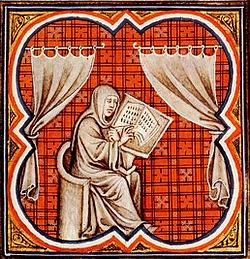One of Alcuin's correspondents and friends was a monk named Richbod. We first know of him as a document clerk in the Lorsch monastery, whose Annals cover the years 703 to 803 (and were mentioned here). Something about him brought him to the attention of Alcuin, who brought him to Charlemagne's court, where he became an advisor to the king and was awarded the position of Abbot of Lorsch by 784 and Archbishop of Trier by 792.
Monasteries where documents were painstakingly copied and re-copied did not always confine themselves to religious texts. Richbod would have been exposed to many different pieces of literature. According to one of Alcuin's letters, Richbod was a huge fan of Vergil's Aeneid. Alcuin even teased him about preferring it to the Gospels. Alcuin wrote to him, lamenting that Richbod did not return an earlier letter:
Lo, a whole year has passed, and I have had no letter from you. Ah, if only my name were Vergil, then wouldst thou never forget me, but have my face ever before thee; ... would that the four Gospels rather than the twelve Aeneids filled your heart.
Modern scholars have looked for reasons to make Richbod the author of the Lorsch Annals. Points in favor of this theory are that the Annals show knowledge of the inner workings of the Carolingian court, and that they end the year before Richbod's death. We do not know when Richbod was born, but if his death were from old age, then it is plausible that the Annals end because he can no longer work on them or direct them. An argument against Richbod's authorship is that the Annals contain flaws in Latin, which seem unlikely if actually authored by Richbod. He may, however, have delegated their writing to a scribe whose command of Latin was less than perfect.
Richbod died in October 804, and was buried in Trier. Curiously, a year later, Charlemagne had a son by the concubine Ethelind, whom he name Richbod. This Richbod became the Abbot of Saint-Riquier. The name is virtually unique in historical records. The Dictionary of Medieval Names defines it as from Old High German "ruler" + "messenger."
As mentioned, what we know of him comes largely from the letters written by Alcuin and preserved by chance. I want to talk more about them next time.

No comments:
Post a Comment
Note: Only a member of this blog may post a comment.